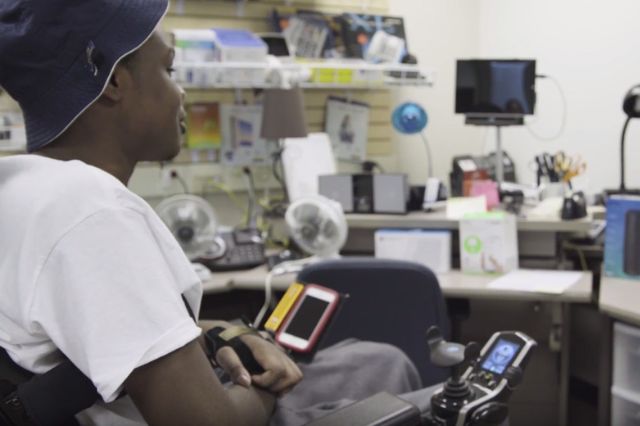Learn About Traumatic Brain Injury
If you are living with or caring for someone with a traumatic brain injury, you likely have many questions. Shepherd Center has compiled information to help patients and their families learn more about brain injury. While the sources and causes of brain injuries may be diverse, most can be categorized into two primary brain injury types.
What is a brain injury?
A brain injury is any injury to the brain that impacts a person's physical, cognitive, or emotional well-being. The triggers of brain injuries are diverse, and the effects on an individual's health can be significant. Brain injuries are primarily divided into traumatic brain injuries (TBI), non-traumatic brain injuries, and concussions.
A TBI is a consequence of an external force inflicting injury to the brain. This could be due to a fall, a vehicle accident, a sports-related injury, or any situation where the head sustains a sudden impact. The intensity of TBI can range from mild to severe, with symptoms of a brain injury varying accordingly.
Non-traumatic brain injury refers to any damage to the brain occurring after birth, including injuries caused by strokes, tumors, infections, or a lack of oxygen to the brain. The effects of non-traumatic brain injury can vary widely, impacting a person's cognitive and physical abilities.
Concussions, a type of mild TBI, typically happen due to a blow to the head or a sudden jarring of the body. It's a common sports injury and can also occur in other situations. Symptoms may include headaches, dizziness, confusion, memory problems, and changes in mood or behavior.
How common is brain injury?
Approximately 1.7 million individuals experience a traumatic brain injury (TBI) annually, with about 5.3 million Americans enduring a TBI-related disability. The highest incidence occurs among men aged 15 to 24. Following a brain injury, survivors face a significantly elevated risk, ranging from 3 to 8 times higher, of experiencing subsequent brain injuries.
Types of Brain Injury
Brain injuries can significantly affect an individual's physical and cognitive abilities. Therefore, understanding the different types of brain injury is vital for an accurate diagnosis and appropriate treatment. The most common types of brain injury include:
A traumatic brain injury (TBI) is defined as a blow or jolt to the head or a penetrating head injury that disrupts the function of the brain. Not all blows or jolts to the head result in a TBI.
The severity of such an injury may range from mild (i.e., a brief change in mental status or consciousness) to severe (i.e., an extended period of unconsciousness or amnesia after the injury). A TBI can result in short- or long-term problems with independent function.
Common Causes of Traumatic Brain Injury
- Motor vehicle accidents
- Falls
- Gunshot wounds
- Military attacks or bomb blasts
- Acts of violence
A non-TBI can result from an illness, oxygen deprivation, metabolic disorders, aneurysms, cardiac arrest, near-drowning experience, etc. In short, it includes injuries to the brain that are not caused by an external physical force to the head. Other nonviolent circumstances, such as tumors and lead poisoning, can also injure the brain.
Although the effects of a non-TBI are comparable to those associated with a TBI, there are some key differences — namely, an impact on the head does not cause them. Non-traumatic brain injury also has a direct impact on cells throughout the brain. Because it attacks the cellular structure, a non-traumatic brain injury can spread to all areas of the brain, while TBI only affects concentrated areas.
Common Causes of Non-Traumatic Brain Injuries
- Anoxic injury: The brain receives inadequate levels of oxygen, usually following cardiac arrest when there is minimal to no blood reaching the brain.
- Toxic or metabolic injury: This occurs after coming into contact with unsafe substances (e.g., lead) or the detrimental accumulation of chemicals manufactured within the body (e.g., kidney failure).
- Encephalitis: This is caused by an infection of the brain.
- Virus: This is the most common cause of non-TBI.
- Brain tumors: Chemotherapy and radiation can be used to diffuse this type of brain injury.
- Meningitis
- Stroke
- Drug abuse
- Hydrocephalus
What part of the brain is responsible for what?
- Frontal Lobe: Responsible for executive functions such as decision-making, planning, reasoning, and problem-solving. It also plays a role in controlling speech, smell, emotions, movement, and behavior.
- Parietal Lobe: Processes sensory information from the body, including touch, temperature, and pain. It's also involved in spatial awareness and perception.
- Temporal Lobe: Responsible for processing auditory information and memory formation. It's also involved in language comprehension and hearing.
- Occipital Lobe: Processes visual information from the eyes and interprets it into meaningful images.
- Cerebellum: Coordinates voluntary movements, balance, and posture. It also plays a role in motor learning.
- Brainstem: Controls basic life functions such as heart rate, breathing, and digestion. It also serves as a pathway for nerve signals traveling between the brain and the rest of the body.
How is a brain injury assessed?
The Rancho Los Amigos Levels of Cognitive Functioning-Tevised is a 10-point system used to characterize TBI. It measures the levels of awareness, cognition, behavior, and interaction with the environment.
- Level 1: No Response: Total Assistance
- Level 2: Generalized Response: Total Assistance
- Level 3: Localized Response: Total Assistance
- Level 4: Confused/Agitated: Maximal Assistance
- Level 5: Confused, Inappropriate, Non-Agitated: Maximal Assistance
- Level 6: Confused, Appropriate: Moderate Assistance
- Level 7: Automatic, Appropriate: Minimal Assistance for Daily Living Skills
- Level 8: Purposeful, Appropriate: Stand-By Assistance
- Level 9: Purposeful, Appropriate: Stand-By Assistance on Request
- Level 10: Purposeful, Appropriate: Modified Indpendent
The Impact of Brain Injury
A brain injury may lead to a wide range of short- or long-term challenges impacting:
Cognitive Function
- Memory
- Attention
- Processing Speed
- Problem-Solving
- Language
Physical Function
- Strength
- Coordination
- Swallowing
- Bowel and Bladder Control
Sensation
- Hearing
- Vision
- Sensation
- Body Awareness
- Smell
Emotion & Behavior
- Depression
- Anxiety
- Irritability/Anger
- Impulse Control
- Personality Changes
Living with Brain Injury
While it’s not always possible to prevent accidents that lead to traumatic brain injury, you can take steps to reduce your risk of brain injury. Certain behaviors are more likely to lead to types of brain trauma, such as not wearing a seat belt, driving under the influence of alcohol or drugs, and not wearing a helmet when participating in sports or recreational activities.
- Remove trip hazards, such as throw rugs.
- Stay healthy and active to reduce your risk of falls.
- Drive sober and distraction free.
- Always wear a seat belt.
- Wear a helmet while riding a bike, skateboard, motorcycle, horse, or ATV.
- Wear a helmet while playing contact sports, skiing, skating or snowboarding.
- Alcohol slows down or stops brain injury recovery.
- Alcohol magnifies some of the cognitive and mood problems caused by brain injury.
- Alcohol lowers the seizure threshold and may trigger seizures.
- Alcohol use increase risk of another brain injury.
Learn more about alcohol use after a traumatic brain injury from the Model System Knowledge Translation Center.
Do
- Follow a bedtime routine.
- Establish a regular bed and wake time.
- Have a regular daytime routine.
- Create a restful atmopshere.
- Minimize screen time before bed.
Don't
- Nap more than 20 minutes during the day.
- Eat, read, watch TV, or do work while in bed.
- Bring screen time into the bedroom.
- Use caffeine, nicotine, alcohol, and sugar for five hours before bedtime.
- Watch the clock.
Talk to your doctor about options to improve your sleep. For more sleep tips, visit the Model System Knowledge Translation Center website.
People with TBI who exercise show fewer symptoms of depression, fatigue, and cognitive problems. Talk to your providers about an exercise plan that meets your physical needs.
The Brain Benefits of Exercise
- Increases production of neurochemicals that promote brain cell repair.
- Boots decision-making skills.
- Improves memory and attention span.
- Prompts growth of new nerve cells and blood vessels.
- Improves multitasking and planning.
Learn more about the benefits of exercise following a brain injury on the BrainLine website.
Use calendars, daily planners, checklists, phone reminders, and pill organizers to help you stay organized and assist your memory.
Stress Management Activities
- Therapy
- Exercise
- Yogs
- Music
- Hobbies
- Nature
- Depression is about eight times more common in the first year after TBI than in the general population (about 50% of people with TBI).
- Seek help! There are many options to help with depression following TBI.
Learn more about depression at the National Institute of Mental Health website.
Traumatic Brain Injury Resources
Do you have a traumatic brain injury, or are you caring for someone with a traumatic brain injury? Visit MyShepherdConnection.org to access brain injury-related educational materials for patients, families, and caregivers. Materials include:
- ABI Caregiver Guide
- Safety Resources for Brain Injury Prevention and Recovery
- Causes and Statistics for Brain Injury
Additional Brain Injury Resources
- Injury Prevention Program
- Shepherd Center’s library, the Noble Learning Resource Center




